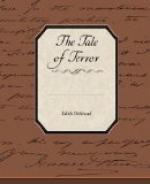“A lamp could not have expired with more awful effect... Darkness impenetrable and immovable filled the room. A violent gust of wind, rising with sudden fury, added fresh horror to the moment... Human nature could support no more ... groping her way to the bed she jumped hastily in, and sought some suspension of agony by creeping far beneath the clothes... The storm still raged... Hour after hour passed away, and the wearied Catherine had heard three proclaimed by all the clocks in the house before the tempest subsided, and she, unknowingly, fell fast asleep. She was awakened the next morning at eight o’clock by the housemaid’s opening her window-shutter. She flew to the mysterious manuscript, If the evidence of sight might be trusted she held a washing bill in her hands ... she felt humbled to the dust.”
Even this bitter humiliation does not sweep away the cobwebs of romance from Catherine’s imaginative mind, but the dark suspicions she harbours about General Tilney are not altogether inexplicable. He is so much less natural and so much more stagey than the other characters that he might reasonably be expected to dabble in the sinister. This time Catherine is misled by memories of the Sicilian Romance into weaving a mystery around the fate of Mrs. Tilney, whom she pictures receiving from the hands of her husband a nightly supply of coarse food. She watches in vain for “glimmering lights,” like those in the palace of Mazzini, and determines to search for “a fragmented journal continued to the last gasp,” like that of Adeline’s father in The Romance of the Forest. In this search she encounters Tilney, who has returned unexpectedly from Woodston. He dissipates once and for all her nervous fancies, and Catherine decides: “Among the Alps and Pyrenees, perhaps, there were no mixed characters. There, such as were not spotless as an angel, might have the dispositions of a fiend. But in England it was not so.”




